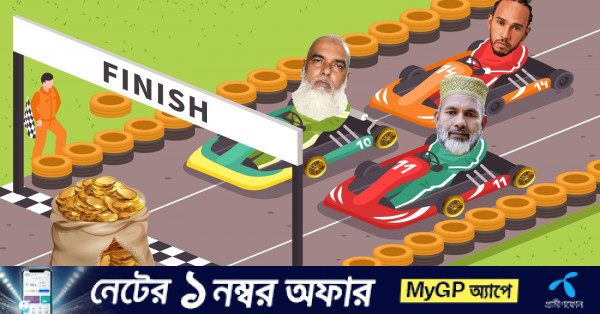Behind the wheels of fortune: Bangladeshi drivers make name with questionable fame


Back in 2007, a Bangladeshi immigrant taxi driver in New York became an instant celebrity after returning a $500,000 bag of diamond rings left behind in his cab by a passenger.
His honesty earned him plaudits and he later said he was proud of what he did, adding, “Cab drivers are honest.”
In 2024, it seems Bangladesh could do with some such cab drivers at a time when professional drivers have come under the spotlight, albeit for a completely opposite reason.
While the country still does not have cabs, which is a tangential issue, it does have a couple of famous drivers with some well-known side hustles.
Most of these side hustles of drivers involve government jobs, government recruitment and government officials’ transfers. It’s almost as if whether the quota remains in place or not, government recruitment hasn’t been able to shed the cobwebs of corruption it finds itself entangled in.
The first story of a driver that comes to mind is obviously Abed Ali.
Ali, a former PSC chairman’s chauffeur, came to the nation’s attention soon after he made a Facebook post announcing the inauguration of a glitzy hotel – Hotel Sun Marina – in Kuakata.
His son, Syed Sohanur Rahman Siam, also made headlines after videos of him surfaced driving expensive cars while studying abroad.
With law enforcers spurred on to follow his trial, he was soon picked up and quizzed, with Abed confessing to guaranteeing employment for job seekers in exchange for Tk18-20 lakh, quota be damned.
While Abed Ali’s confession led to a slew of arrests, his lifestyle also warranted a lot of interest.
All in all, an investigation by the Criminal Investigation Department revealed Ali had amassed wealth exceeding Tk500 million, which included a six-storey building and three flats in addition to a car. He also owns a duplex building in his Madaripur village, where he was eyeing the chairman seat.
Interestingly, while Ali may have tried to become an inspiration for other drivers, the questions he leaked were for the post of the deputy assistant engineer of Bangladesh Railway.
It seems when it comes to controversial drivers, the Bangladesh Railway just can’t stay away. Even if the driver themselves aren’t to blame for what transpires.
The BGB-gate
Let’s set the scene.
It’s 11:30pm on a balmy April night in 2012.
Azam Khan, driver of the-then railway minister Suranjit Sengupta’s assistant personal secretary, suddenly drives his microbus into Pilkhana despite being asked to stop by the guards.
He gets inside and the car screeches to a halt.
With him are APS Faruq Talkuder, railway’s general manager (east) Yusuf Ali Mridha and Dhaka division security commandant Enamul Huq.
As he is driving into the BGB headquarters through gate No 4, Faruq asks him where he was going.
“I said, ‘sir, this is bribe money. Money taken from railway jobseekers. I will have you arrested with this money’,” Azam later said in a televised interview.
According to Aza, Faruq then tries to convince him to turn the car around by offering Tk5 lakh. He then offers half the total, before finally saying Azam could have the whole thing.
But Azam refuses, according to the interview he gave.
When stopped by the security, Azam Khan declares that there was illegal money in the car.
The armed security then detains the four for the night, but they are freed the next day. Aside from Azam, the three leave in another car with the money.
Azam turns whistleblower.
It was said the money was going to the railway minister’s house. Eight days after the incident came to light, Suranjit resigned from his position and was appointed minister without portfolio. He was not elected for a cabinet position after the 2014 election.
While Azam’s tale began after entering a gate, another driver’s story ended with a door.
Knockin’ on corruption’s door
A man’s taste in decor is influenced by two things: wealth and upbringing.
Abdul Malek, a driver of the Directorate General of Health Services (DGHS), should not have had so much of the wealth through an honest living.
But there it was, his majestic door, the entryway to one of Malek’s multiple homes in the capital.
Malek’s tryst with the law began when he was arrested by RAB on charges of possessing an illegal firearm and trading in fake currencies.
Investigations revealed that over the years, Malek had accumulated wealth worth crores of taka through illegal activities.
Appointed as a master roll staff in 1982 and promoted to Class III four years later, Malek’s rise to wealth began in 2009 when he started driving the car of the then director general of the DGHS.
He allegedly formed a six-member syndicate to control recruitment, promotion and transfer of officers and other employees at different levels of the DGHS.
By lobbying high officials, the syndicate helped hundreds of people get jobs illegally at the DGHS since 2009, said RAB officers, adding that some top officers at the department were linked with them in the process and were financially benefited.
During that period he allegedly amassed several crores of taka by lobbying for the appointment of over 100 assistant directors in upazila level.
The influence he wielded belied his position.
By the time law enforcers caught a whiff of what Malek was up to, he had already brought under his name three multi-storey buildings in the capital, 24 flats, a dairy firm, and some other properties, which were worth over Tk100 crore.
While he would drive his superiors in a government car, he would travel to and from work in his own luxurious vehicle.
While Malek’s name would fade in four years, the image of his intricately-crafted door remained, enduring and permanent.
With government jobs now a hot topic, it begs the question whether quota reforms are enough when the system itself is rife with corruption. From top officers to the lowest-level employees, when everyone comes under the anti-graft net, who else will be left?
And what answers will they have? This isn’t Drive to Survive and this drama is no longer thrilling.




